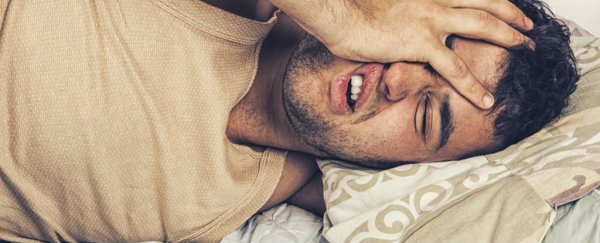Today NASA has confirmed that for the third month in a row, we've smashed global temperature records, with February 2016 not only being declared the hottest February in recorded history, but it's also the hottest February in recorded history by the largest ever margin.
NASA has also confirmed that 2015 was the hottest year on record, and 15 of the 16 warmest years on record have occurred since 2001, so… you guessed it: we've got a lot of hot nights ahead of us. And that's not just bad news for the environment - researchers say a string of hot, sweaty nights can leave you feeling like you've woken up with a serious hangover.
Turns out that while it might feel nice to rip off the doona and sleep naked in the cool sheets, your body actually needs some low-temperature nights to ensure a proper night's sleep, according to Christopher Gordon, a research scientist in thermal biology and sleep at the University of Sydney in Australia.
"For us to fall asleep, what needs to happen is a thermal or body temperature cascade has to occur," he told Jenna Price at The Sydney Morning Herald. "[Y]ou need to get rid of heat from the body … the maximal rate of core temperate decline gives you the greatest opportunity to get to sleep."
Turns out, the relatively low temperature of 18 degrees Celsius (65 degrees Fahrenheit) is the absolute best for a good night's sleep, because that's what it takes for your body to lose a lot of the heat it's accumulated during the day.
According to the US National Sleep Foundation, your body temperature will fluctuate naturally throughout the day, but will reach its lowest level at around 5am, when you should be well and truly into your 'deep sleep' phase. After this point, your body temperature will slowly rise again as morning approaches.
This delicate rise and fall of body temperatures can be thrown out of whack if your room is too hot or too cold, and if your body can't hit that 'sweet spot' at around 4-5am, you'll likely be restless and missing out on those vital deep sleep hours. And that's when the painful mornings happen.
As Gordon explains, if you've been hot all day, and you come home to an unairconditioned house, your body doesn't have much of a chance to cool itself down - you're "maximally dilated", and there's no escape, he says.
"[B]ecause it's been quite humid, you are more likely to sweat, and the sweat will stay on your skin because it's warm … and then you wake up because you are uncomfortable," he told The Sydney Morning Herald.
Not only does a poor night's sleep bring with it the symptoms of a hangover, including fluid retention, puffy skin, headaches, a lack of concentration, poor memory, and increased blood pressure, it can also seriously affect your health and metabolism.
Markham Heid from Time Magazine describes the results of a 2014 study by the US National Institutes of Health, where participants were asked to sleep in rooms cooled to optimal temperatures for a month:
"Healthy men who spent a month sleeping in a cool (but not cold) 66-degree room (18 degrees Celsius) increased their stores of metabolically active brown fat, says Francesco Celi, chair of Virginia Commonwealth University's division of endocrinology and metabolism. 'Brown fat' may not sound very desirable, but it actually helps your body burn calories and dispose of excess blood sugar, he explains."
"We found that even a small reduction in bedroom temperature affects metabolism," Celi added.
So we know that most of us are in store for a whole lot more hot nights in our lifetime - for Australians, February 2016 had the equal fewest number of nights under 19 degrees in recorded history - and many of us aren't lucky enough to live in temperature-regulated homes, so what can we do to make sure all that inevitable heat doesn't mess with our sleep (and sanity)?
Senior research fellow at the Australian Centre for Sleep Research, Siobhan Banks, told Price at The Sydney Morning Herald that a simple two-fan solution - one for each bed occupant - can work well, and a cold shower before bed can also help your body lose some of that heat it's accumulated throughout the day.
The best thing to do is try different methods to cool down, and figure out what works best for you. The last thing you need is the feeling of a hangover without the fun.
"When you are constantly having restricted or impaired sleep that will lead to feeling more sleepy and less productive during the day," says Gordon. "There are safety concerns in the workplace … and everyone is going to feel a lot more exhausted."
